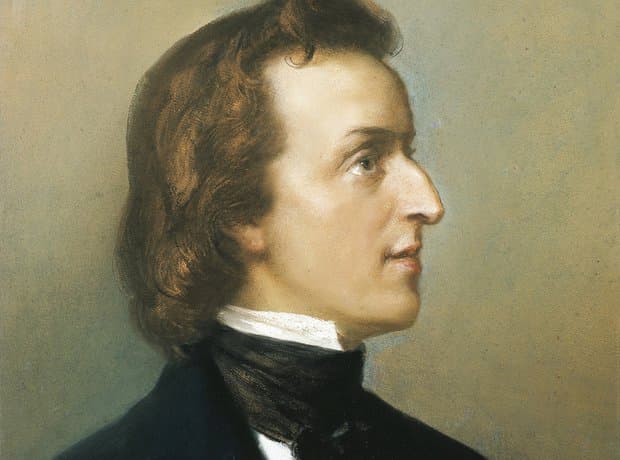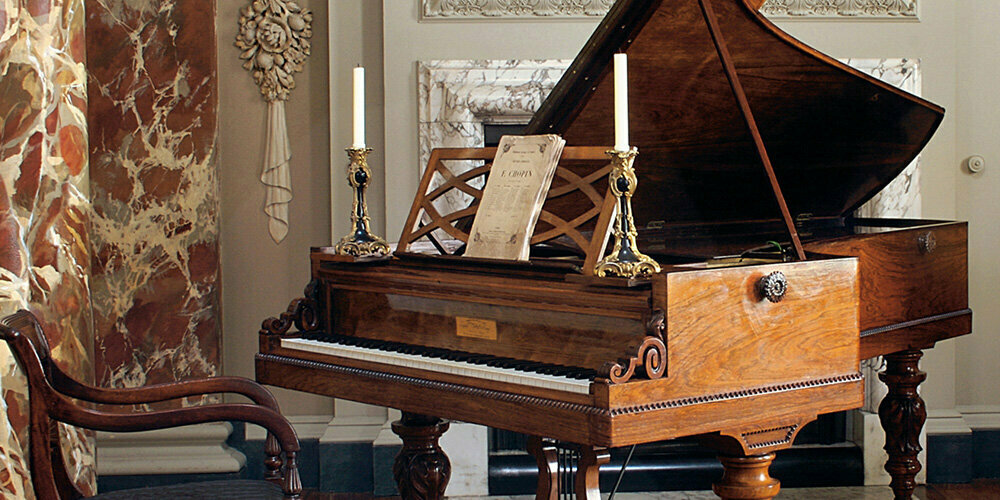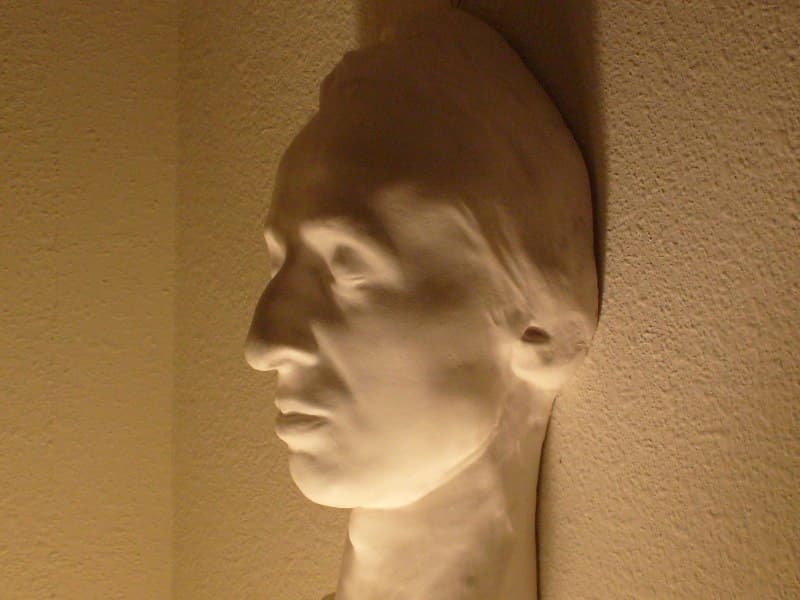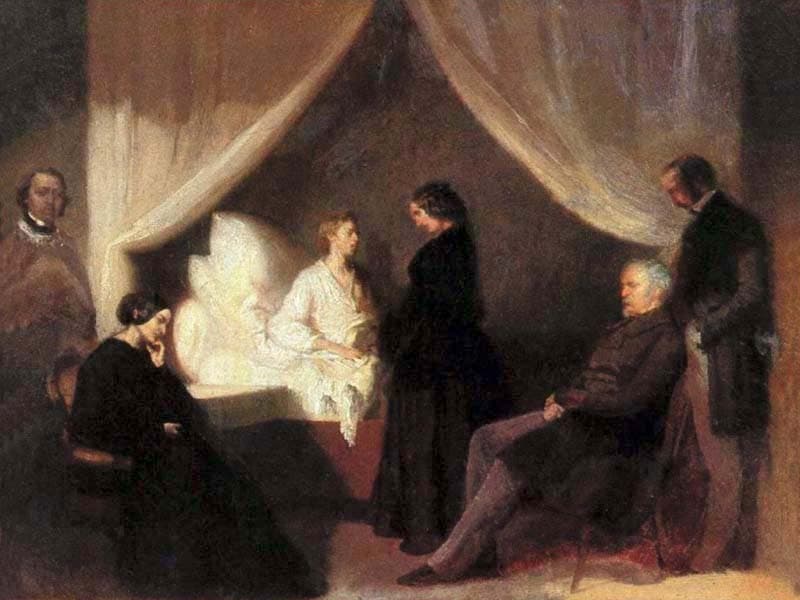It's all about the classical music composers and their works from the last 400 years and much more about music. Hier erfahren Sie alles über die klassischen Komponisten und ihre Meisterwerke der letzten vierhundert Jahre und vieles mehr über Klassische Musik.
Total Pageviews
Friday, July 21, 2023
Jane Stirling: Why Did This Piano Student Pay for Chopin’s Funeral?
by Emily E. Hogstad, Interlude

Frédéric Chopin © ClassicFM
Jane Stirling’s Childhood
Jane Wilhelmina Stirling was born 15 July 1804 in Perthshire in central Scotland. She was the daughter of John Stirling of Kippendavie, a wealthy landowner who had property in Scotland and the West Indies, and his wife Mary.
Jane was born into a big family: she had twelve older siblings! Tragically, her mother died when she was a child, and then her father died a few years later. The grieving teenage heiress moved in with her older sister Katharine Erskine, a young and independent widow.
Despite the tragedies of her teenage years, Stirling proved to be a social butterfly. She loved the arts, playing the piano, and going to dances and balls. As the legend goes, over thirty men proposed to her, but she turned them all down because she never fell in love with any of them.
Young Adulthood in Paris
In 1826, when Stirling was twenty-two, her older sister brought her to Paris. The sisters loved the city so much that they began to live part-time in France.
When the time came for Stirling to choose a Parisian piano teacher, she chose Frédéric Chopin, a mutual acquaintance of her former teacher, pianist Lindsay Sloper. Chopin and Stirling became friends. Chopin respected her and her musicianship enough to pass along one of his students to her, and in 1844, she was thrilled to find out that he dedicated two nocturnes to her (the pair in his op. 55).
At the time, Chopin was in the midst of an unraveling relationship with author George Sand, and he was trying to come to grips with his new lifestyle. Stirling wanted to help. So they came to an unconventional arrangement: Stirling would serve as a kind of agent and business manager to help keep Chopin’s life running smoothly. She even took on arranging his concerts and worked with him on assembling the French-bound volumes of his works.
George Sand’s daughter wrote about Stirling and Erskine:
“During lessons, when you visited the Master you could meet two tall persons, typical Scottish women, skinny, pale, in indefinite age, serious, dressed in black, never smiling. Under this quite gloomy appearance, there were lofty, noble, and devoted hearts.”
Chopin’s Helper
Stirling seems to have been rather omnipotent in Chopin’s life during this time. She saw to all of the details of his famous Salle Pleyel concert in February 1848, down to the temperature of the auditorium and the choice of flowers. He played a Mozart piano trio, his cello sonata, and some relatively undemanding pieces for solo piano. After the concert was done, he staggered backstage to Stirling and collapsed in her arms. It would be his last Paris concert. In March, revolution broke out, and many of Chopin’s aristocratic supporters fled the country.
A couple of months later, Stirling arranged for him to visit London. Chopin dreaded the rigors of traveling, but he needed the money badly, so in the spring of 1848, they set off together.
Chopin’s Last Tour – And a Proposal?

Chopin’s Pleyel grand piano, 1848 (The Cobbe Collection, UK)
While in London, Chopin ended up keeping three pianos in his room from three different makers. His furious landlord doubled the rent, but Stirling stepped in to cover the cost for him. The social highlight of this English visit came when he performed for Queen Victoria and her husband Prince Albert at a private party.
After the stay in London, he took the train to Edinburgh, per Stirling’s suggestion. He played in Manchester, Glasgow, and Edinburgh. Tickets were expensive – and Jane purchased many of them herself, then gave them away for free. Ominously, while Chopin was in Edinburgh, feeling that he would not live much longer, he drew up a will.
Rumors swirled of an impending engagement between the sick man and his energetic promoter, but Chopin never made a formal offer of marriage. Something about Stirling grew to irritate him – maybe his growing weakness and his increasing dependence on both her and her sister. He wrote things to friends like “A rich woman needs a rich husband” and “They have married me to Miss Stirling; she might as well marry death.” The sisters’ enthusiastic promotion of Protestantism was also proving to be extremely grating.
Chopin’s Death and Its Aftermath
In November 1848, Chopin left the gloomy British Isles to return to Paris. He was deeply in debt, and Stirling quietly paid those debts off. His condition only deteriorated. Over the course of 1849, it became clear that Chopin’s death was imminent. After much suffering, in October he passed away from what is generally believed to have been tuberculosis.

Chopin’s death mask © Wikipedia
After he died, Stirling dressed in mourning black, as if her husband had passed away. She paid the cost of his extravagant funeral at Paris’ famous La Madeleine (although Chopin’s sister Ludwika eventually paid back the cost), and it was attended by thousands. Fearing unscrupulous thieves or souvenir hunters, it is believed by historians that she was likely the anonymous buyer who purchased much of Chopin’s estate, including his famous death mask, to distribute to those who loved him. She also saw that his preserved heart would be brought from Paris to Warsaw.
A portrait she’d commissioned of Chopin by Polish artist Teofil Kwiatkowski turned into a deathbed portrait. Pictured in the portrait is Chopin, dressed in white, and surrounded by the dark-clothed figures of author Aleksander Jełowicki, Chopin’s sister Ludwika, piano student Marcelina Czartoryska, Polish politician Wojciech Grzymała, and the artist. Stirling is nowhere to be found: she’s already slipping into the background of the historical record.

Chopin on His Deathbed, by Kwiatkowski, 1849, commissioned by Jane Stirling.
To mark the first anniversary of his death, Stirling wrote to Ludwika asking for a handful of Polish soil so that she could sprinkle it on Chopin’s grave. The request was granted. In a particularly moving gesture, Stirling paid to have one of Chopin’s pianos shipped to Ludwika, and the two women carried on a considerable correspondence after his death, tending to matters of his legacy.
Intriguingly, according to legend, Chopin told Stirling – and Stirling alone – his true date of birth. She is said to have written it down, placed it in a box, and buried it with him.
Stirling’s Post-Chopin Life and Legacy
Stirling lived for another decade after Chopin’s death and died of an ovarian cyst in 1859. She never married. She left most of Chopin’s estate to his mother. It ended up in a palace in Warsaw, where it was destroyed by Russian troops in 1861.
Jane Stirling may not be nearly as famous as Chopin’s other caretaker figure, George Sand, but she was certainly one of his most faithful friends and one of the people we have to thank today for helping to preserve the rich musical legacy that her friend and teacher left behind.
Tony Bennett, last of classic American crooners, dead at 96
AT A GLANCE
- Raised in an era when big bands defined US pop music, Bennett achieved an improbable second act when he started winning over young audiences in the 1990s -- not by reinventing himself but by demonstrating his sheer joy in belting out the standards.

Tony Bennett (Facebook)
Tony Bennett, the last in a generation of classic American crooners whose ceaselessly cheery spirit bridged generations to make him a hitmaker across seven decades, died Friday in New York. He was 96.
Raised in an era when big bands defined US pop music, Bennett achieved an improbable second act when he started winning over young audiences in the 1990s -- not by reinventing himself but by demonstrating his sheer joy in belting out the standards.
And then at age 88, Bennett in 2014 became the oldest person ever to reach number one on the US album sales chart through a collection of duets with Lady Gaga -- who became his friend and touring companion but only one of a long list of younger stars who rushed to work with the singing great.
Bennett's publicist, Sylvia Weiner, announced his death.
Likened since the start of his career to Frank Sinatra, Bennett first tried to distance himself but eventually followed much of the same path as other crooners of yore -- singing in nightclubs, on television and for movies, although his attempts to act ended quickly.
His gift proved to be his stage presence.
With a welcoming smile and dapper suit, he sang with gusto and a smooth vibrato in a strong, clearly enunciated voice, which he kept in shape through training from the operatic Bel Canto tradition.
Starting with his recording of the film song "Because of You" in 1951, Bennett sang dozens of hits including "Rags to Riches," "Stranger in Paradise" and, in what would become his signature tune, "I Left My Heart in San Francisco," which landed him two of his career's 19 Grammy Awards.
But the British Invasion led by The Beatles initially took a toll on the singer, whose music suddenly sounded quaint and antiquated. He nearly died of a cocaine overdose in 1979 before sobering up and eventually reviving his career.
"When rap came along, or disco, whatever the new fashion was at the moment, I didn't try to find something that would fit whatever the style was of the whole music scene," Bennett told the British culture magazine Clash.
"I just stayed myself and sang sincerely and tried to just stay honest with myself -- never compromising, just doing the best songs that I could think of for the public.
"And luckily it just paid off."
Singing as hardscrabble youth
Tony Bennett -- his stage name came after advice from showbiz A-lister Bob Hope -- was born Anthony Dominick Benedetto in the Astoria neighborhood of New York's Queens borough.
His father was a struggling grocer who immigrated from southern Italy's Calabria region, to which his mother also traced her ancestry.
He showed early promise as an entertainer, singing at age nine next to legendary New York mayor Fiorello LaGuardia when he ceremonially opened the city's Triborough Bridge, now known as the Robert F. Kennedy Bridge.
But his father's death at age 10, at a time when the United States was still struggling to exit the Great Depression, led him to leave school and earn money through jobs including singing at Italian restaurants and caricature painting, which remained a lifelong side career.
During World War II, Bennett was drafted into the 63rd Infantry Division and was sent to France and Germany. But he was demoted after cursing out an officer from the South who objected to Bennett dining with an African American friend in the then racially segregated army.
As punishment, Bennett spent his tour of duty digging out bodies and shipping them. But after the Allied victory, Bennett found an unexpected break into music as he waited with fellow troops in Wiesbaden, Germany to return home.
With the city's opera house still intact, a US Army band performed a weekly show to be broadcast on military radio across Germany. Taken on as the band's librarian, Bennett quickly impressed with his voice and was made one of four vocalists.
"During this period in the army, I enjoyed the most musical freedom I've ever had in my life," Bennett later wrote in his autobiography, "The Good Life."
"I could sing whatever I wanted, and there was no one around to tell me any different," he wrote.
Outspoken against racism and war
When he returned to the United States, he took formal singing lessons through the GI Bill, which covered educational expenses for returning troops.
His experiences made Bennett a lifelong liberal. He became especially enraged in the 1950s when he played in Miami with jazz pioneer Duke Ellington, who was not allowed to attend a press party due to segregation at the hotel.
In a then risky move for a popular entertainer, he accepted an invitation from singer Harry Belafonte to join civil rights icon Martin Luther King in the 1965 march from Selma, Alabama in support of equal voting rights for African Americans.
He later wrote in his memoir that the hostility of the white state troopers reminded him of Nazi Germany.
He was also an outspoken opponent of war, at times raising controversy.
"The first time I saw a dead German, that's when I became a pacifist," he told popular radio host Howard Stern days after the September 11, 2001 attacks.
Late in life, still cool
Bennett was married three times and had four children including Antonia Bennett, who has followed his path as a singer of pop and jazz standards.
But his son Danny Bennett was most instrumental in his father's career, aggressively courting MTV and other players in the pop world as a manager for his father.
By the early 1990s, Bennett -- his style and look little changed from the 1960s, except for more gray hair -- was appearing in music videos on MTV and singing warm-up at concerts by alternative rock giants such as Smashing Pumpkins and Porno for Pyros.
Proof that Bennett was back came in 1993 when he presented a prize at the MTV Video Music Awards alongside the Red Hot Chili Peppers, who hailed his cool factor and playfully sang part of "I Left My Heart in San Francisco."
His career only kept building and a decade later, he released three successful albums of duets. On one of them, "Body and Soul," he sang with Amy Winehouse in her last recording before she died in 2011 at age 27.
He marked his 90th birthday with a star-studded concert at New York's Radio City Music Hall, which was turned into a television special and album.
The title was taken from a song popularized by Bennett: "The Best Is Yet to Come."
Bennett toured the United States and Europe into his final decade, playing his last public performance before the coronavirus pandemic halted touring in New Jersey on March 11, 2020.
Soon after, he revealed he had been diagnosed with Alzheimer's disease in 2016. He had kept his condition quiet for years.
Upon turning 95, Bennett played two more birthday concerts, again at Radio City Music Hall, with Lady Gaga -- shows billed as his farewell to New York.
He then canceled the remainder of his 2021 tour dates on "doctors' orders."
"And let the music play as long as there's a song to sing / And I will stay younger than spring," he crooned during the first of his farewell shows, in a rendition of his ballad "This Is All I Ask."
"You've been a good audience," Bennett said prior to his encore. "I love this audience."